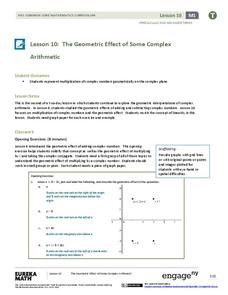Curated OER
Adding & Subtracting (Combining) Integers
Maintain a positive atmosphere in your math class with this fun lesson on adding and subtracting integers. After first explaining the rules for combining positive and negative numbers, this resource uses a comic strip...
Willow Tree
Number Properties
The number of basic algebraic properties can become overwhelming for learners. A lesson explains and gives examples for all the basic algebraic properties. The resource is perfect to use as a way for pupils to organize and...
Virginia Department of Education
Balanced
Bring balance to your lesson plans with an activity that asks individuals to solve one-step linear equations with inverse operations. Balance scales help learners understand the concept of isolating the variable.
EngageNY
Properties of Inequalities
Class members explore the meaning of inequality by comparing numbers and building number sentences. Using number cubes, pupils find numbers and compare them using inequality symbols. As the activity continues, operations are added to...
EngageNY
Using the Identity and Inverse to Write Equivalent Expressions
The fifth installment in the series of 28 lessons helps math scholars explore the result of adding opposite numbers and multiplying reciprocals. Through this exploration, they develop a working definition of identity and inverse properties.
EngageNY
The Geometric Effect of Some Complex Arithmetic 2
The 10th lesson in a series of 32, continues with the geometry of arithmetic of complex numbers focusing on multiplication. Class members find the effects of multiplying a complex number by a real number, an imaginary number, and another...
West Contra Costa Unified School District
Lowest Common Multiple through the Grades
The LCM will be your new BFF. Learners review least common multiple and least common denominator applications, mostly on fractions, from middle school. Scholars then see how the LCM can be applied to various types of problems from...
West Contra Costa Unified School District
Solving Rational Equations
Scholars first learn to solve two-step equations with fractional coefficients and constants by traditional methods and by clearing the denominator. They continue by learning another approach to solve two-step equations that have decimal...
Alabama Learning Exchange
Exponents and Division
Create a human fraction to learn about division of exponents. Scholars develop the rule for division of exponents by being part of a human fraction to explore and justify the rule. They also consider zero exponents and negative exponents.
Curriculum Corner
7th Grade Math "I Can" Statement Posters
Translate the Common Core math standards into a series of achievable "I can" statements with this collection of classroom displays. Offering posters for each standard, this resource is a great way to support your seventh graders as...
EngageNY
Writing and Expanding Multiplication Expressions
Find out what's so standard about standard form. Scholars learn to write multiplication expressions with variables in the 10th lesson in a series of 36. They use different symbols for multiplication and translate between standard and...
Curated OER
Properties of Equality
What assumptions are made in order to solve equations? An instructional slideshow provides an overview and guided examples of how properties of equality can be used to justify each step in solving equations.











